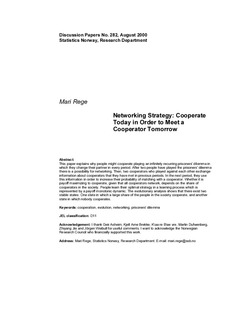| dc.contributor.author | Rege, Mari | |
| dc.date.accessioned | 2011-12-13T10:31:44Z | |
| dc.date.available | 2011-12-13T10:31:44Z | |
| dc.date.issued | 2000 | |
| dc.identifier.issn | 1892-753x | |
| dc.identifier.uri | http://hdl.handle.net/11250/180097 | |
| dc.description.abstract | This paper explains why people might cooperate playing an infinitely recurring prisoners' dilemma in which they change their partner in every period. After two people have played the prisoners' dilemma there is a possibility for networking. Then, two cooperators who played against each other exchange information about cooperators that they have met in previous periods. In the next period, they use this information in order to increase their probability of matching with a cooperator. Whether it is payoff maximizing to cooperate, given that all cooperators network, depends on the share of cooperators in the society. People learn their optimal strategy in a learning process which is represented by a payoff monotonic dynamic. The evolutionary analysis shows that there exist two stable states: One state in which a large share of the people in the society cooperate, and another state in which nobody cooperates. | no_NO |
| dc.language.iso | eng | no_NO |
| dc.publisher | Statistics Norway, Research Department | no_NO |
| dc.relation.ispartofseries | Discussion Papers;No. 282 | |
| dc.subject | Networking | no_NO |
| dc.subject | Prisoners' dilemma | no_NO |
| dc.subject | Cooperation | no_NO |
| dc.subject | Evolution | no_NO |
| dc.subject | JEL classification: D11 | no_NO |
| dc.title | Networking strategy: Cooperate today in order to meet a cooperator tomorrow | no_NO |
| dc.type | Working paper | no_NO |
| dc.subject.nsi | VDP::Social science: 200::Sociology: 220 | no_NO |
| dc.source.pagenumber | 13 s. | no_NO |
